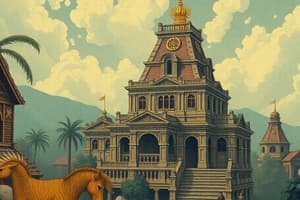Podcast
Questions and Answers
How did imperialism affect the political power dynamics between colonizers and indigenous populations?
How did imperialism affect the political power dynamics between colonizers and indigenous populations?
Imperialism enhanced national power for colonizers and often disregarded local populations' rights, leading to subjugation.
What were the main economic motivations behind colonization?
What were the main economic motivations behind colonization?
The main economic motivations included resource extraction, market expansion, labor exploitation, and investment opportunities.
In what ways did colonizers attempt to assimilate indigenous cultures?
In what ways did colonizers attempt to assimilate indigenous cultures?
Colonizers used education systems, imposed their language, promoted religious conversion, and suppressed local customs.
What role did technological advancements play in the colonial process?
What role did technological advancements play in the colonial process?
Explain the significance of military presence in maintaining colonial rule.
Explain the significance of military presence in maintaining colonial rule.
How did colonies serve as investment opportunities for European nations?
How did colonies serve as investment opportunities for European nations?
What impact did the imposition of Western education have on indigenous societies?
What impact did the imposition of Western education have on indigenous societies?
Discuss the effects of agricultural changes introduced by colonizers.
Discuss the effects of agricultural changes introduced by colonizers.
Flashcards are hidden until you start studying
Study Notes
Economic Motivations
- Resource Extraction: Colonizers aimed to extract valuable resources (minerals, spices, agricultural products) from colonies.
- Market Expansion: Colonies provided new markets for European goods, boosting trade and profit.
- Labor Exploitation: Use of enslaved or indentured labor to increase production and reduce costs.
- Investment Opportunities: Colonies served as sites for European investment, fostering economic growth in the colonizing countries.
Political Power Dynamics
- Imperialism: Colonies were viewed as extensions of national power, enhancing the global status of the colonizing nation.
- Territorial Control: Established borders and governance, often disregarding local populations and cultures.
- Military Presence: Colonizers used military force to subjugate and control indigenous populations.
- Geopolitical Strategy: Strategic locations (ports, trade routes) were seized to enhance military and economic dominance.
Cultural Assimilation
- Education Systems: Introduction of Western education aimed at reshaping local identities and values.
- Language Imposition: Promotion of the colonizer's language to facilitate administration and control.
- Religious Conversion: Missionary efforts to convert indigenous people to Christianity, often undermining local beliefs.
- Cultural Erasure: Suppression of indigenous customs, practices, and languages in favor of colonial cultures.
Technological Advancements
- Transportation: Development of railroads, steamships, and roads to facilitate movement of goods and troops.
- Communication: Introduction of telegraphy and postal systems to improve governance and control.
- Agricultural Techniques: Implementation of new farming methods and machinery to increase productivity.
- Industrialization: Colonies often provided raw materials for European industrial growth and served as sites for manufacturing.
Economic Motivations
- Colonizers focused on resource extraction, targeting valuable items such as minerals, spices, and agricultural products to maximize profits.
- Colonies opened new markets for European goods, facilitating trade expansion and enhancing economic gain for colonizers.
- Enslavement and indentured servitude were common practices to exploit labor, reducing production costs and increasing outputs.
- European investment in colonies stimulated economic development, creating opportunities for growth in the colonizing countries.
Political Power Dynamics
- Colonial territories were often regarded as extensions of national power, which increased the global prominence of colonizing nations.
- The implementation of territorial control involved establishing borders and governance structures, ignoring the rights and cultures of local populations.
- Military force was frequently used by colonizers to assert dominance and maintain control over indigenous populations.
- Strategic locations, such as ports and trade routes, were seized to strengthen military and economic capabilities.
Cultural Assimilation
- Colonizers established Western education systems to reshape the identities and values of local populations, promoting colonial ideals.
- Language imposition was a tactic employed to facilitate administration, reinforcing the power of the colonizers over indigenous cultures.
- Missionary activities aimed at religious conversion led to the erosion of local belief systems, prioritizing Christianity over indigenous practices.
- Indigenous customs and languages were often suppressed in favor of colonial culture, resulting in cultural erasure.
Technological Advancements
- The development of transportation infrastructure, including railroads and steamships, enhanced the movement of goods and military forces.
- Innovations in communication, such as telegraphy and postal systems, improved governance and control in colonized regions.
- New agricultural techniques and machinery were introduced to increase productivity, transforming local farming practices.
- Colonies frequently served as sources of raw materials for European industrialization while also being utilized for manufacturing processes.
Studying That Suits You
Use AI to generate personalized quizzes and flashcards to suit your learning preferences.




